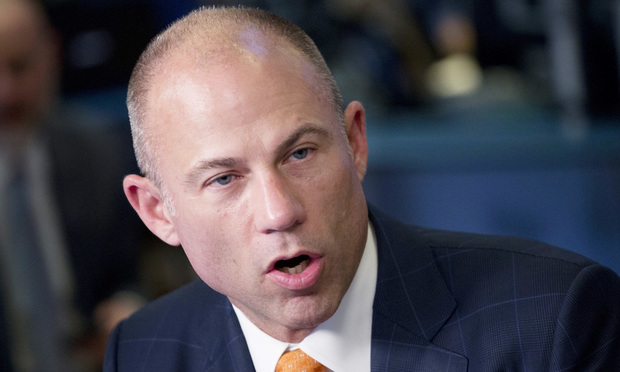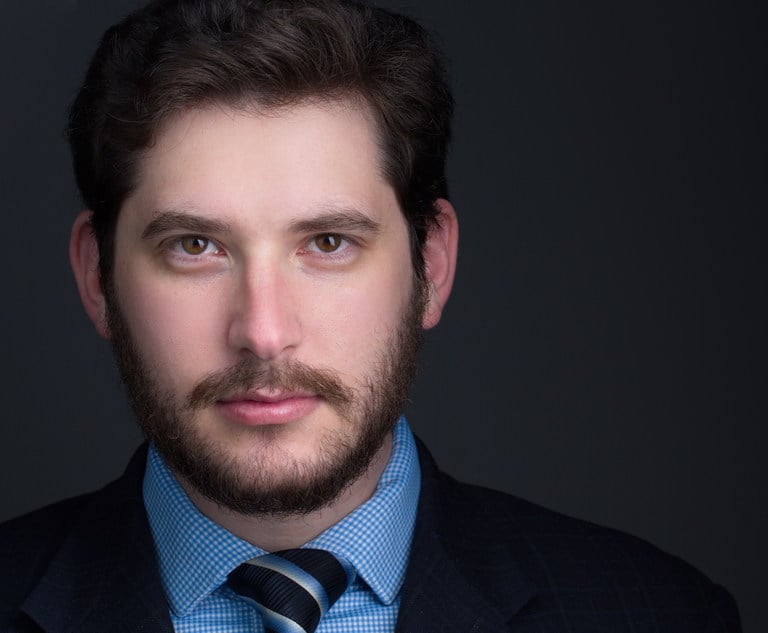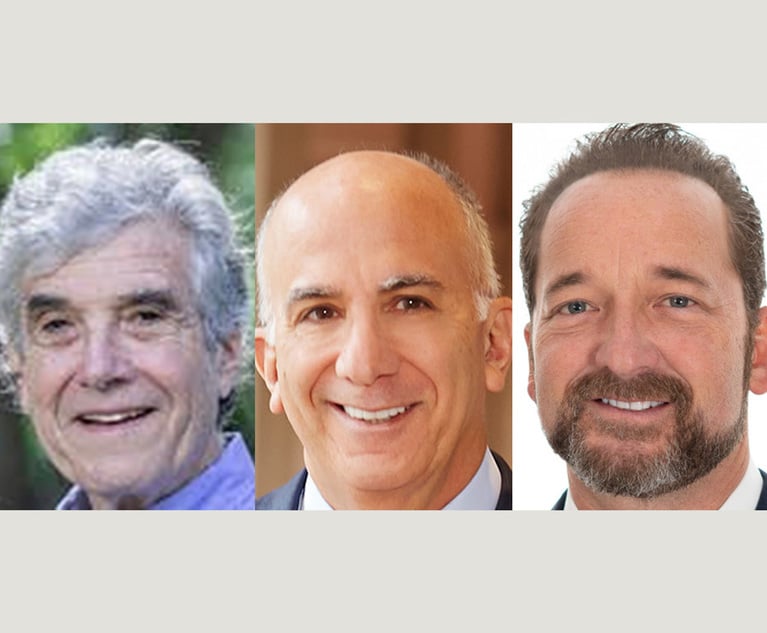Law in the Time of Twitter: Do Chatty Lawyers Help or Hinder Their Careers?
Tweeters and non-tweeters render their verdict on Twitter, which has heralded the dawn of chatty lawyers who weigh in on Supreme Court decisions, current events — and sometimes, each other.
February 11, 2019 at 02:38 PM
8 minute read
 California attorney Michael Avenatti. Photo: AP/Mark Lennihan.
California attorney Michael Avenatti. Photo: AP/Mark Lennihan.
With the rise of Twitter, a new breed of tech-savvy, loose-lipped lawyers has emerged. They've banded together, forming legal communities like #LawTwitter, #TrialTwitter and #LadyLawyerDiaries, allowing attorneys to swap ideas, keep up with national case law and share war stories.
But it's not all peace and love in the Twitterverse. On Feb. 4, New York attorney Diego Aranda Teixeira aired his grievances against California attorney Michael Avenatti, tweeting, “OMG, Michael Avenatti CALLED ME AND HE'S CRAZY.” The post prompted a reply from Avenatti, who labeled Teixeira “a terrible lawyer.”
No – I called you a terrible lawyer who thinks Twitter is a forum to attack other lawyers when you don't know what the hell you are talking about. How long have you been practicing? Because from what I can tell, it's about 2 min. You need to learn the law before you pop off.
— Michael Avenatti (@MichaelAvenatti) February 5, 2019
With the era of chatty lawyers in full swing, tweeters and non-tweeters render their verdict on whether the platform helps or hinders the legal realm.
According to Brian Cuban, Texas lawyer, author, speaker and activist, “Legal Twitter” is a powerful factor — and it comes with many positives.
Cuban has long advocated for better mental health, wellness and addiction recovery resources for lawyers, and says Twitter's legal subsets have spread the word about various problems and stresses, creating a space that reminds those affected they're not alone.
“We are starting to see a core group of Twitter users tweet around this topic, and hopefully #LegalWellness Twitter will become an important and permanent forum for those looking for information and resources on the topic,” he said.
That said, Cuban's witnessed lawyers lose their jobs or clients over a tweet.
“I've seen on more than one occasion an ill-advised tweet have a negative job impact, whether it's a lawyer or someone in another profession,” he said. “When I get involved in a heated discussion, I always try to take a deep breath and think three steps out on where my tweet could end up before I hit send.”
John G. Browning of Passman & Jones in Texas has written three books on social media and the law and said he's noticed the positive impact that Cuban's tweeting has had on the legal community.
“It is both increasing awareness and providing a much-needed forum for lawyers to share on a very important issue,” Browning said.
Though he's not much of a tweeter, Browning follows legal newsfeeds like Supreme Court Places. And in his opinion, The Florida Bar has the “least stuffy” Twitter handle of all bar associations.
But there are some cautionary tales to bear in mind, Browning pointed out.
In September 2018, New York lawyer Frank Aquila tweeted that White House Press Secretary Sarah Sanders should “rot in hell” for applauding a senator who defended Supreme Court Justice Brett Kavanaugh during his confirmation hearing.
Related story: Sullivan & Cromwell Partner Apologizes for 'Rot in Hell' Tweet After Kavanaugh Hearings
Texas lawyer Robert Ranco resigned from his firm in 2017 after tweeting that he would “be OK” if Education Secretary Betsy DeVos were the victim of sexual assault, following her department's Title IX policy reforms.
“It's great to have an active online presence,” Browning said, “But remember that even if you think that you're speaking out on a matter that's personal to you or in the news, people are always going to look first at the fact that you're a lawyer.”
 David Oscar Markus of Markus Moss. Courtesy photo.
David Oscar Markus of Markus Moss. Courtesy photo.Miami criminal defense attorney David Oscar Markus writes the Southern District of Florida Blog and said his legal “blogosphere” has significantly shifted toward Twitter.
“It's a great platform for lawyers and legal news,” Markus said. “It's quick, timely, and in most cases, educational. Judges and lawyers from across the country are able to share legal developments as they happen.”
And he's noticed another plus.
“It's taught lawyers not to be so wordy,” Markus said. “These quotes are less than 280 characters.”
'Complaining into the void'
Another avid tweeter, Adrian Arkin of Mintz Truppman in Miami, opened up about past racial biases on Twitter on Feb. 2.
In Arkin's view, there's nothing wrong with lawyers engaging in healthy public discourse on any subject.
“The opportunity to have conversations with other lawyers and interact with the top legal minds is an extraordinary opportunity that should not be wasted,” Arkin said. “Of course, there is a difference between the exchange of ideas or opinions, and just complaining into the void.”
That said, Arkin urges lawyers to consider their client's needs before tweeting, because there's always someone watching.
“While most people are not on Twitter, the vast majority of publications and media are,” Arkin said.
That's precisely why Miami complex litigator Lawrence A. Kellogg said he stayed away. In Kellogg's view, cyberspace can be a judgmental place.
“It's very easy to sit behind a computer and a handle and say whatever it is you want. It's harder to do that face-to-face,” Kellogg said. “I tell young lawyers when they're fighting with other lawyers by email, 'Pick up the telephone, because neither of you will act this way when you're speaking to each other.' ”
When attorneys use Twitter for public flame wars, they can also run the risk of breaking ethics rules, according to Kellogg.
“ Any lawyer in Florida, for example, takes an oath that says they will abstain from all rude, disruptive, disrespectful and abusive behavior and will at all times act with dignity, decency and courtesy.”
Judges with handles
 Texas Supreme Court Justice Eva Guzman. Courtesy photo.
Texas Supreme Court Justice Eva Guzman. Courtesy photo.But it's not just lawyers on the platform.
Texas Supreme Court Justice Eva Guzman joined Twitter when she ran for judicial office in 2009 and admits she was initially frightened of the Twitterverse.
“I was hesitant in the beginning but I think I have found a way to use it, and I try to be careful and mindful of our obligations as judges, what we represent and what the public expects and are entitled to from us,” Guzman said.
Guzman follows newsfeeds like #AccessToJustice and enjoys keeping up with other judges — particularly those who make her laugh, like Chief Michigan Supreme Court Justice Bridget McCormack.
“It's a light moment in what is otherwise a pretty intense profession,” Guzman said. “Also, they sometimes tweet about what's going on in their courts, and I find that exchange of ideas is helpful. They might cause you to think differently about what you're doing in your own court.”
The golden rule, in Guzman's mind, is to stay apolitical, remembering that judges serve people of all perspectives from every walk of life. Politics aside, if Twitter can help humanize judges for the general public, then Guzman's all for it.
“Is it so much different than going to a bar function and saying hello to everyone and engaging in conversation with them?” she said. “Ethically, I think those are the same boundaries, but there may be a temptation on Twitter to go beyond that. But I think most judges on Twitter do a really good job.”
Michigan Judge Qiana Lillard also tweets regularly, even posting about the Grammy Awards on Sunday night, and commenting in January that, “People tell me all the time I don't look like a judge even when I'm in my robe at official events.”
Lillard sees Twitter as a news source and networking tool but conceded that cyber fights are off-putting.
“Lawyers should know that we can disagree respectfully. That's the beauty of the legal profession,” she said. “People on opposite sides of an issue using the same law and facts to argue their respective position. It's important in all arenas, especially social media, that (this) be done with decency and professional decorum.”
Related stories:
Former Chief Justice Encourages Judges to Get Off Facebook
How Many Lawyers Does It Take to Write a Status Update? A Lot
This content has been archived. It is available through our partners, LexisNexis® and Bloomberg Law.
To view this content, please continue to their sites.
Not a Lexis Subscriber?
Subscribe Now
Not a Bloomberg Law Subscriber?
Subscribe Now
NOT FOR REPRINT
© 2025 ALM Global, LLC, All Rights Reserved. Request academic re-use from www.copyright.com. All other uses, submit a request to [email protected]. For more information visit Asset & Logo Licensing.
You Might Like
View All
Tragedy on I-95: Florida Lawsuit Against Horizon Freight System Could Set New Precedent in Crash Cases
2 minute read
'You Lied to the Jury': Veteran Awarded $5 Million in Defamation Case Against CNN
4 minute read
Mastering Mediation: Insights from High-Stakes Negotiators

Vedder Price Shareholder Javier Lopez Appointed to Miami Planning, Zoning & Appeals Board
2 minute readTrending Stories
Who Got The Work
J. Brugh Lower of Gibbons has entered an appearance for industrial equipment supplier Devco Corporation in a pending trademark infringement lawsuit. The suit, accusing the defendant of selling knock-off Graco products, was filed Dec. 18 in New Jersey District Court by Rivkin Radler on behalf of Graco Inc. and Graco Minnesota. The case, assigned to U.S. District Judge Zahid N. Quraishi, is 3:24-cv-11294, Graco Inc. et al v. Devco Corporation.
Who Got The Work
Rebecca Maller-Stein and Kent A. Yalowitz of Arnold & Porter Kaye Scholer have entered their appearances for Hanaco Venture Capital and its executives, Lior Prosor and David Frankel, in a pending securities lawsuit. The action, filed on Dec. 24 in New York Southern District Court by Zell, Aron & Co. on behalf of Goldeneye Advisors, accuses the defendants of negligently and fraudulently managing the plaintiff's $1 million investment. The case, assigned to U.S. District Judge Vernon S. Broderick, is 1:24-cv-09918, Goldeneye Advisors, LLC v. Hanaco Venture Capital, Ltd. et al.
Who Got The Work
Attorneys from A&O Shearman has stepped in as defense counsel for Toronto-Dominion Bank and other defendants in a pending securities class action. The suit, filed Dec. 11 in New York Southern District Court by Bleichmar Fonti & Auld, accuses the defendants of concealing the bank's 'pervasive' deficiencies in regards to its compliance with the Bank Secrecy Act and the quality of its anti-money laundering controls. The case, assigned to U.S. District Judge Arun Subramanian, is 1:24-cv-09445, Gonzalez v. The Toronto-Dominion Bank et al.
Who Got The Work
Crown Castle International, a Pennsylvania company providing shared communications infrastructure, has turned to Luke D. Wolf of Gordon Rees Scully Mansukhani to fend off a pending breach-of-contract lawsuit. The court action, filed Nov. 25 in Michigan Eastern District Court by Hooper Hathaway PC on behalf of The Town Residences LLC, accuses Crown Castle of failing to transfer approximately $30,000 in utility payments from T-Mobile in breach of a roof-top lease and assignment agreement. The case, assigned to U.S. District Judge Susan K. Declercq, is 2:24-cv-13131, The Town Residences LLC v. T-Mobile US, Inc. et al.
Who Got The Work
Wilfred P. Coronato and Daniel M. Schwartz of McCarter & English have stepped in as defense counsel to Electrolux Home Products Inc. in a pending product liability lawsuit. The court action, filed Nov. 26 in New York Eastern District Court by Poulos Lopiccolo PC and Nagel Rice LLP on behalf of David Stern, alleges that the defendant's refrigerators’ drawers and shelving repeatedly break and fall apart within months after purchase. The case, assigned to U.S. District Judge Joan M. Azrack, is 2:24-cv-08204, Stern v. Electrolux Home Products, Inc.
Featured Firms
Law Offices of Gary Martin Hays & Associates, P.C.
(470) 294-1674
Law Offices of Mark E. Salomone
(857) 444-6468
Smith & Hassler
(713) 739-1250






